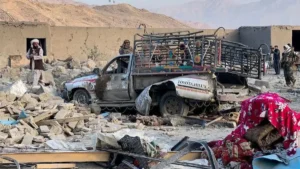The World Bank’s report, ‘Water For Shared Prosperity,’ unveiled at the 10th World Water Forum, delineates the critical role of water in fostering equitable societies amidst global water access disparities exacerbated by population growth, urbanization, and climate change. It highlights the urgency of comprehensive strategies to ensure inclusive water security worldwide.
Defining Shared Prosperity
Shared prosperity, as per the World Bank, involves bolstering economic well-being, particularly for marginalized segments, through four interconnected building blocks: Health and Education, Jobs and Income, Peace and Social Cohesion, and Environment.
Key Findings
Global Disparities in Water Access
- 197 million lack safe drinking water; 211 million lack basic sanitation.
- 450 million reside in high-poverty, low-water-access areas.
- Less than half of schools in low-income countries have water access.
Impact on Early Childhood Development
- Inadequate water impacts physical and cognitive growth, leading to malnutrition and diseases.
Climate Change and Water Security
- Extreme weather events disrupt water availability, impacting learning and food security.
Recommendations for Inclusive Water Security
Improving Resilience
- Implement early warning systems and resilient infrastructure.
Water Resources Development
- Integrate nature-based solutions and optimize water use.
Safely Managed Water Supply
- Reform water information systems and invest in safe management infrastructure.
Role of World Water Forum
The forum is crucial for elevating water issues on the political agenda and fostering actionable solutions.
Way Forward
Collaborative efforts are imperative to implement recommendations, ensuring inclusive and resilient water security.




 India-Israel Elevate Ties to ‘Special St...
India-Israel Elevate Ties to ‘Special St...
 Operation Ghazab lil-Haq: Pakistan Decla...
Operation Ghazab lil-Haq: Pakistan Decla...
 India, Bangladesh Among 40 Nations Hit b...
India, Bangladesh Among 40 Nations Hit b...








